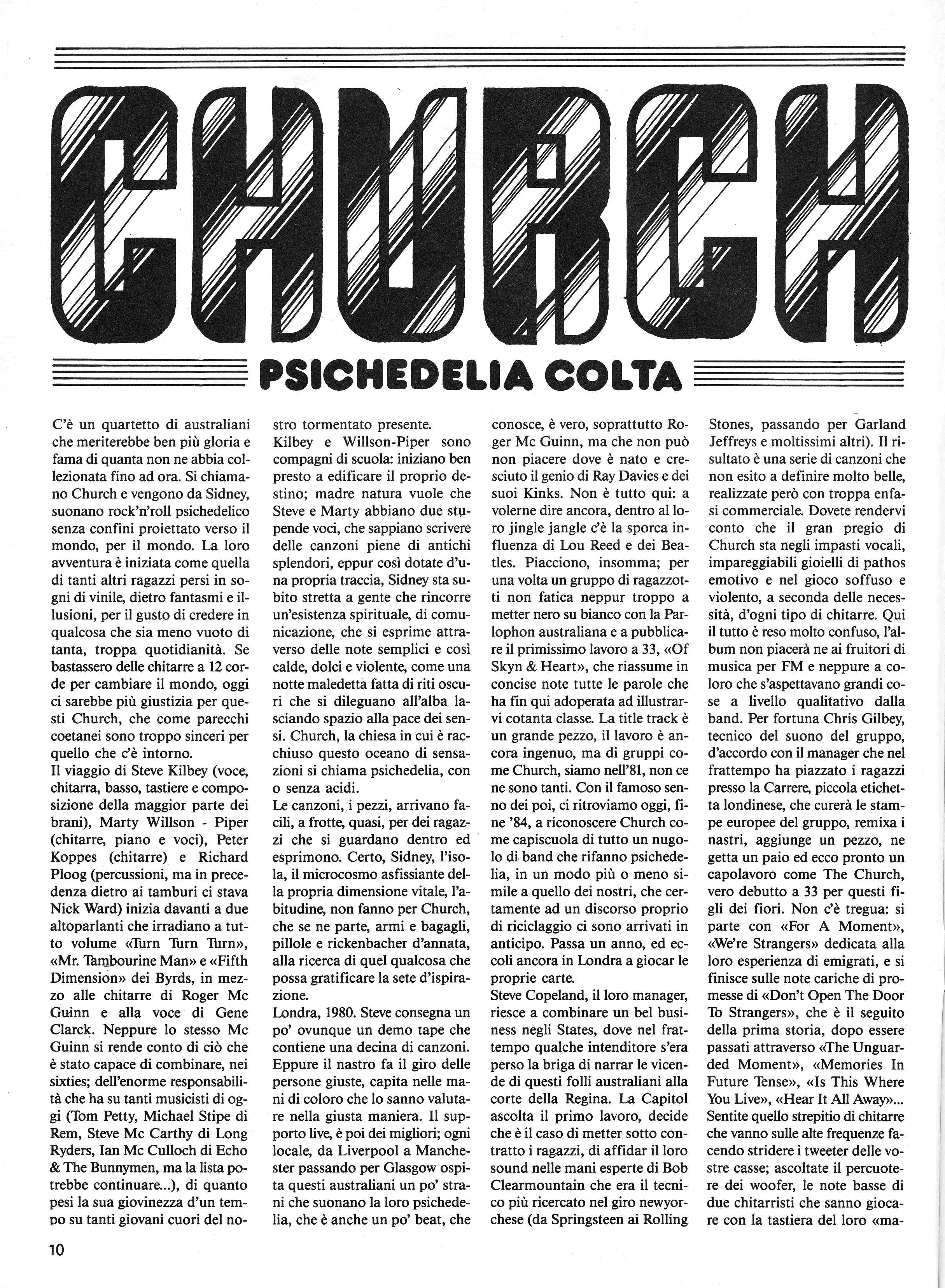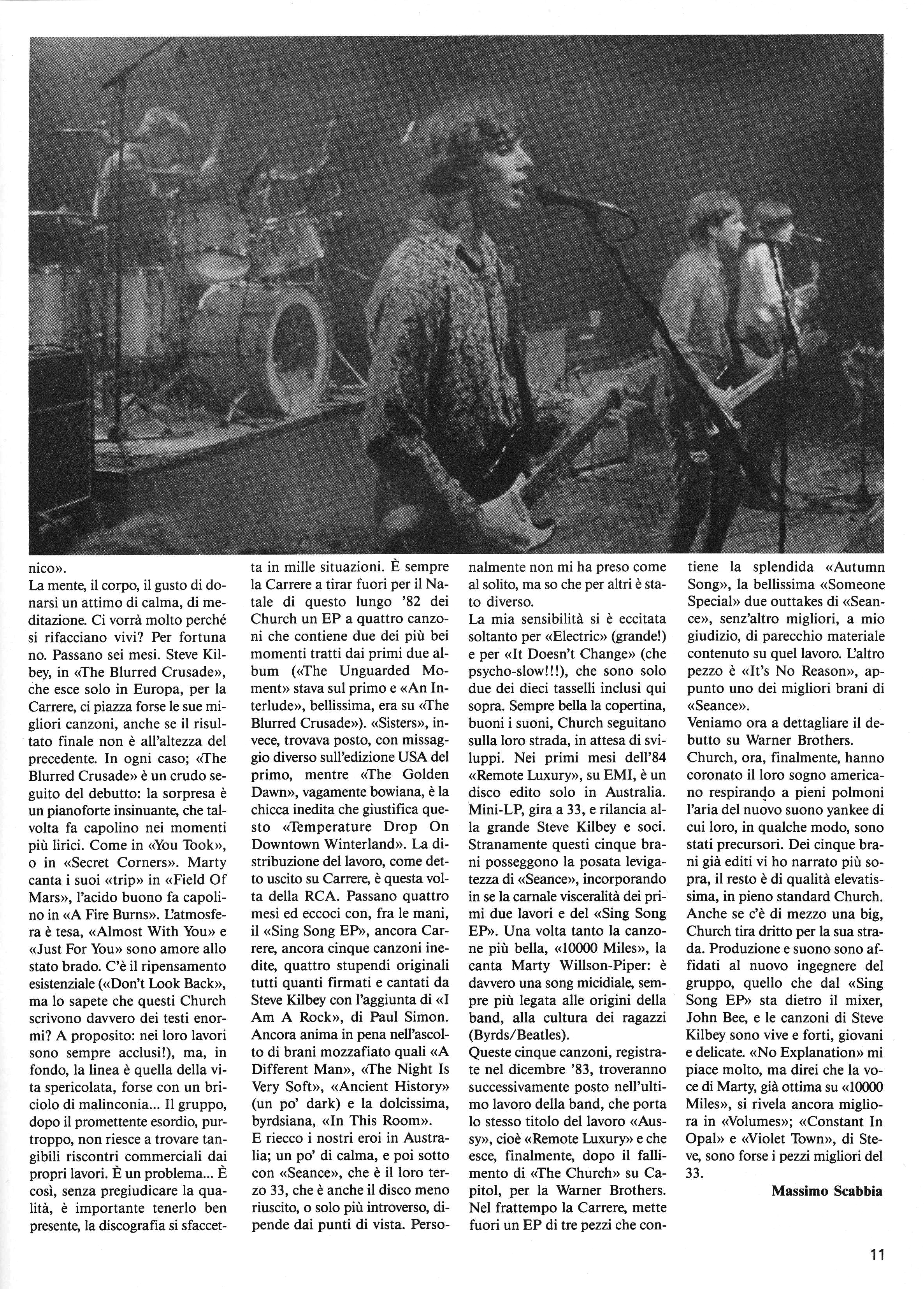
Scabbia Buscadero - November 1984



Scabbia Buscadero - November 1984


(translated using Google Translate and DeepL, some context or meaning may be lost in ttranslation)
CULTURED PSYCHEDELIA
There is a quartet of Australians which deserves much more glory and fame than he has not collected until now. They are called The Church and they come from Sydney, they play psychedelic rock'n'roll without borders projected towards the world, for the world. Their adventure started like that of many other boys lost in dreams of vinyl, behind ghosts and illusions, for the sake of believing in something that is less empty than so much, too much everyday life. If 12-string guitars were enough to change the world today there would be more justice for these Church, who like several peers are too sincere for what's around.
Steve Kilbey (vocals, guitar, bass, keyboards and composition of most tracks), Marty Willson-Piper (guitars, piano and vocals), Peter Koppes (guitars) and Richard Ploog (percussion, but earlier behind the drums there was Nick Ward) starts in front of two speakers that radiate to everything volume "Turn Turn Turn", "Mr. Tambourine Man" and "Fifth Dimension" by the Byrds, in the middle to Roger McGuinn's guitars and Gene Clark's voice. Not even McGuinn himself realizes what he was able to combine, in the sixties; of the enormous responsibility which has on so many musicians today (Tom Petty, Michael Stipe of Rem, Steve McCarthy of Long Ryders, Ian McCulloch of Echo & The Bunnymen, but the list might continue ...), of how much weighs his former youth on so many young hearts of our tormented present.
Kilbey and Willson-Piper are [schoolmates]: start well, quick to build their own destiny; mother nature wants that Steve and Marty have two gorgeous voices, who know how to write of songs full of ancient splendours, yet so endowed with one own track, Sydney is right away close to people chasing a spiritual existence, of communication, which is expressed through some simple notes and so hot, sweet and violent, like one cursed night made of dark rites that vanish at dawn leaving space for peace of mind. Church, the church in which it is enclosed this ocean of sensations is called psychedelia, with or acid-free.
The songs, the pieces, they come easy, in droves, almost, for boys who look inside and they express. Sure, Sydney, the island, the asphyxiating microcosm of one's vital dimension, habit, they don't do for Church, who leaves, arms and luggage, vintage pills and Rickenbacker, looking for that something that may gratify the thirst for inspiration.
London, 1980. Steve delivers a demo tape almost everywhere that contains about ten songs. Yet the tape goes around the right people, it happens in the hands of those who know how to evaluate it in the right way. The support live, it is also one of the best; every local, from Liverpool to Manchester passing through Glasgow hosts these somewhat strange Australians playing their psychedelia, that's also a little beat, that it is true that he knows Roger McGuinn above all, but he can't not like where he was born and raised the genius of Ray Davies and gods his Kinks. That's not all: I want to say more, within their jingle jangle there is the dirty influence of Lou Reed and the Beatles. In short, they like it; for once a bunch of kids does not struggle even too much to put pen to paper with the Parlophone label to publish the very first LP "Of Skins & Heart", which he summarizes in concise notes all the words that up to now he has tried to illustrate you such great class. The title track is a great piece, work is still naive, but of groups like The Church, we are in 81, there are not many. With the famous hindsight of then, we meet again today, end of 1984, to recognize The Church as head of a whole cloud of bands that remake psychedelia, in a more or less similar way to that of ours, which certainly to a speech of its own of recycling got there advance. A year passes, and here they are still in London to play their own cards.
Steve Copeland, their manager, manages to combine a good business in the States, where in the meantime some connoisseur takes the trouble of narrating the events of these crazy Aussies to the court of the Queen. Capitol listen to the first album, decide which is the case to put under contract to the boys, to entrust their sound in Bob Clearmountain's expert hands, who was the technician most sought after in the New York tour (from Springsteen to Rolling Stones, via Garland Jeffreys and many others). The result is a series of songs that I do not hesitate to define very beautiful, but made with too much commercial emphasis. You have to surrender I realize that the great merit of The Church is in the vocal mixes, incomparable jewels of emotional pathos and in the soft and violent, as needed, of all kinds of guitars. Here the whole thing is made very confusing, the album users will not like it music for FM and not even those who expected great things in terms of quality from the band. Thankfully Chris Gilbey, sound engineer of the group, agree with the manager that in the meanwhile he has placed the boys at Carrere, a small London label, who will take care of the European releases of the group, remix the tapes, adds a couple of pieces, and here is a masterpiece”The Church”, the real album debut for these children of the flowers. There is no respite: it starts with "For A Moment
We're Strangers” dedicated to their experience of emigrants, and yes ends on notes full of promises
by “Don't Open The Door To Strangers”, which is the sequel of the first story, after being passed
through “The Unguarded Moment”, “ Memories In Future Tense”, “ls This Where You Live”, “Tear lt All Away” ...Hear that clatter of guitars going on the high frequencies doing screech the tweeters of your speakers; listen to the beating of the woofers, the low notes of two guitarists who know how to play with the fretboard of their "neck."
The mind, the body, the pleasure of giving oneself a moment of calm, of meditation. Will it take a long time to come back to life? Fortunately no. Six months pass. Steve Kilbey, in "The Blurred Crusade", which comes out only in Europe on Carrere, we place perhaps his best songs, even if the final result is not up to the previous. In any case; "The Blurred Crusade” is a raw sequel of the debut: the surprise is an insinuating piano, which sometimes peeps in the more lyrical moments. As in "You Took", or in “Secret Corners”. Marty sings his "trips" in "Field Of Mars”, the good acid peeps out in "A Fire Burns". The atmosphere is tense, "Almost With You" and "Just For You" are love in the wild. There is an existential afterthought ("Don't Look Back", but do you know that these Church actually
write huge lyrics? By the way: in their works the lyrics are always included!), but, in the line is one of
reckless living, perhaps reckless life, perhaps with a hint of melancholy... The group, after the promising debut, unfortunately, cannot find tangible commercial feedback from their works. It's a problem ... It is thus, without compromising the quality, it is important to keep it well present, the discography is multifaceted in a thousand situations. Carrere brings out for Christmas 1982 a four-song EP by The Church which contains two of the most beautiful moments from their first two albums ("The Unguarded Moment" was on the first one and "An Interlude” was on "The
Blurred Crusade”). "Sisters", on the other hand, found a place, with different mixing on the US edition of the first, while ”The Golden Dawn” is their unprecedented gem that justifies this
“Temperature Drop In Downtown Winterland”. The distribution of work, as mentioned released on Carrere, it is this time of the RCA. Four months pass and here we are with, in our hands, the "Sing Songs EP", again Carrere, five more unreleased songs, four beautiful originals all signed and sung by Steve Kilbey with the addition of “I Am A Rock”, by Paul Simon. Still a soul in pain listening to breathtaking songs such as “A Different Man “,” The Night Is Very Soft "," Ancient History"
(a little dark) and the sweetest, byrdsiana, "In This Room".
And here are our heroes back in Australia; a little bit of calm, and then it's on with "Seance", which is their third album, which is also the least successful, or just more introverted, depending on your point of view. Personally it did grab meas much as usual, but I know that for others it was
different. My sensitivity got excited only for "Electric" (great!) and for “It Doesn't Change” (psycho-slow! ! !), which are only two of the ten titles included here. The cover is always beautiful, good sounds, Church follow on their way, waiting for developments. In the first months of 1984 “Remote Luxury”, on EMI, is a disc published only in Australia. Mini-LP, spin to 33, and raise to great Steve Kilbey and associates. Strangely these five songs possess the cutlery smoothness of “Seance”, incorporating in itself the carnal viscerality of the former two works and the “Sing Songs EP". Once in a while the most beautiful song, "10000 Miles", sung by Marty Willson-Piper: it is truly a deadly song, always more linked to the origins of band, to kids' culture (Byrds / Beatles).
These five songs, recorded in December '83, they will find subsequently placed in the last work of the band, which has the same title of the work, that is ”Remote Luxury “ and that finally comes out after bankruptcy of "The Church" on Capitol, for Warner Brothers. Meanwhile Carrere puts out a three-piece EP that contains the splendid “Autumn Soon “, the beautiful “Someone Special”, two outtakes of “Séance”. Certainly better, in my opinion than a lot of material on that work. The other piece is "It's No Reason", in fact one of the best songs of "Seance."
We come now to detail the debut on Warner Brothers. TheChurch, now, finally, they have their American dream came true breathing deeply the air of the new yankee sound of which they, in some way, are precursor states. Of the five songs already published I told you above, the rest is of very high quality, in full Church standard. Even if there is a big one involved, Church pulls straight on his way. Production and sound are entrusted to the new engineer of the group, the one that from the "Sing Songs EP" stands behind the mixer, John Bee, and Steve Kilbey's songs are alive and strong, young and delicate. "No Explanation" I really like it, but i would say the one by Marty, already excellent on “10000 Miles”, he turns out to be even better in "Volumes"; "Constant In
Opal "and" Violet Town ", by Steve, are perhaps the best pieces of the LP.
Massimo Scabbia
Return to 1984 index